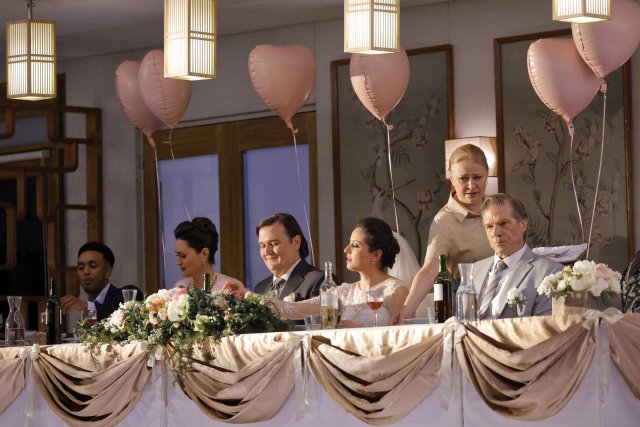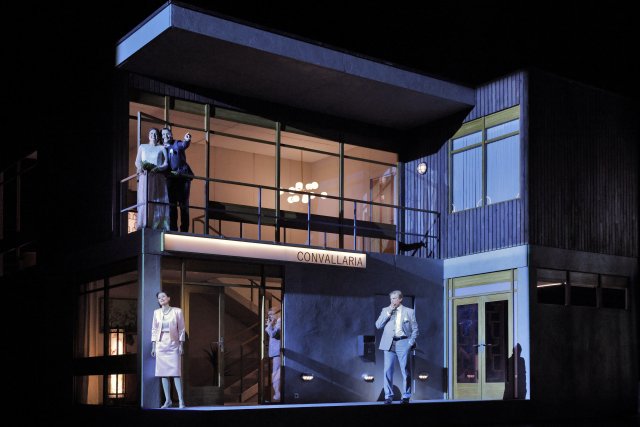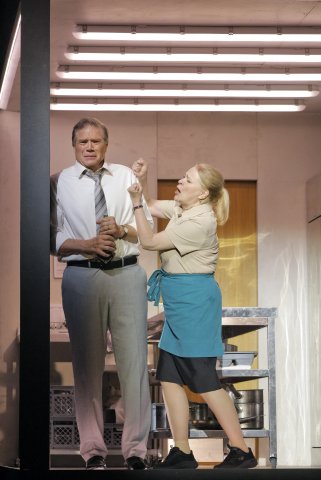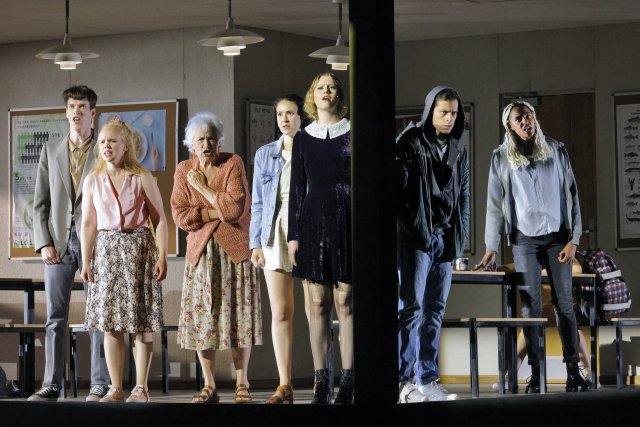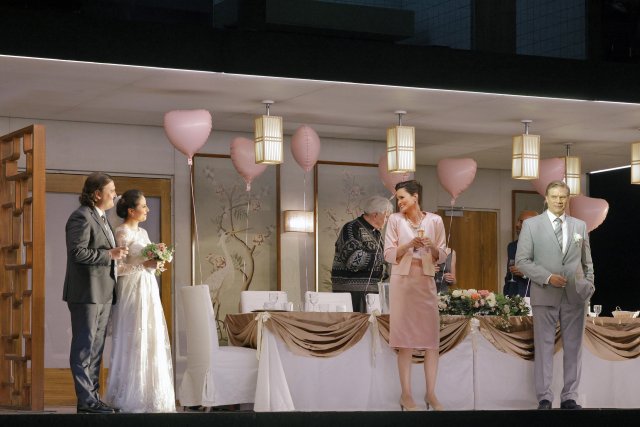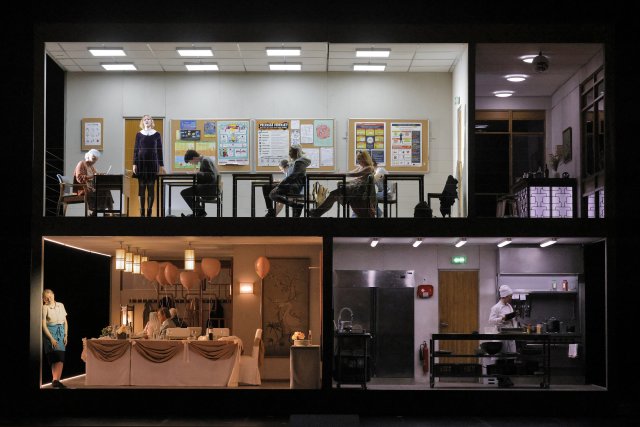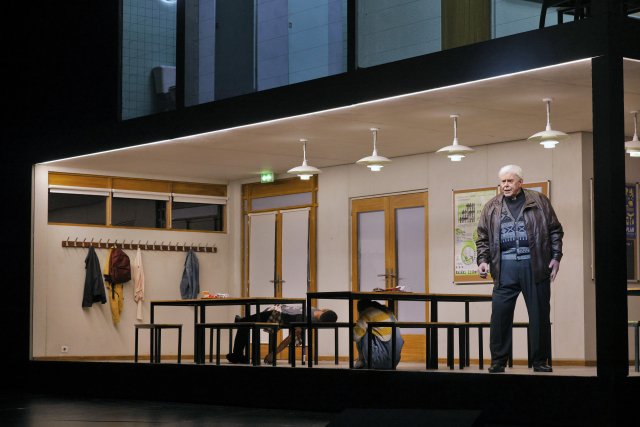Innocence
San Francisco Opera's Chilling Modern Masterpiece
By: Victor Cordell - Jun 09, 2024
Upon receiving a commission from the Royal Opera House to write an opera on the contemporary world, great Finnish composer Kaija Saariaho enlisted noted storyteller and countrywoman Sofi Oksanen to be her librettist. Because the opera was to be dramaturged and ultimately to be adapted into a multilingual script, Aleksi Barrière was added to the composition team. Not having written for opera before, Oksanen asked what subject had not been tackled in the medium, only to find that opera has explored virtually every manner of existence, psychologically, socially, and historically. The ultimate decision was to plumb rare uncharted territory, the global scourge of our time which Finland had just suffered – mass murder.
The incongruously titled “Innocence” results, a masterpiece of true brilliance. Co-commissioner San Francisco Opera presents its American premiere in a most memorable, compelling, and powerful production that any opera aficionado will do well to see. The action grips throughout, while the edgy music creates the feeling of imbalance and terror. Regrettably, while Saariaho lived to witness the world premiere, she died a year ago before the full rollout of the commission productions.
After an ominous overture opened by a rumbling orchestra and haunting reeds, the uncommon innovation of the work with multiple conceits manifests itself from the first scene. To begin with, the narrative alternates repeatedly between two time frames, ten years apart. The first surrounds the killing of a number of students by one of their classmates at a high school in Finland. The second takes place at a small wedding reception at which the waitress realizes that the groom is the brother of the shooter whose victims included the waitress’s daughter.
Producer Simon Stone and Revival Director Louise Bakker have integrated wildly complex and coordinated creative elements into a phenomenal muscular whole. The action of the opera takes place on Chloe Lamford’s striking two-level revolving cube set design which is used to great advantage depicting various rooms within both major venues. Central to the wedding component is the elegant and composed Last Supper design of the reception party, while the school scenes are ragged and chaotic. The production crew stealthily makes changes to sides of the cube when they are facing away from the audience. James Farncombe’s contrast lighting adds drama and symbolism.
Breaches of opera convention begin with the nature of vocalization. While operatic-style singing prevails in the wedding scenes, the school sequences are dominated by three variants employed largely by actors rather than opera artists – simple spoken word, amplified speaking for special effect, and songs and singing in a folk/pop idiom. Another distinction is that the libretto includes nine languages, owing to the international nature of the school and the wedding between a Finn and a Romanian. Although the departures from the norm read almost as a checklist of how to grab attention with unique features, they integrate exquisitely.
The general public certainly has deep sorrow and sympathy for the victims of mass shootings and their families. But “Innocence” goes beyond the superficial to examine the lives of the survivors and the families of the perpetrators, leading a deeper understanding of the complexities of the consequences of these events. Those students who escaped without helping others are forever plagued by the fear that they may have caused deaths by saving their own lives. A boy is unable to be in a room without facing the door. The tormented and hesitant waitress Tereza (splendid mezzo Ruxandra Donose) repeats behaviors daily as if her daughter were still alive. The parents of the killer lead lives of social isolation, and the couple scornfully diverges on whether to reconcile with the shooter son or never to see him again. More provocative is a look at the back stories of the deceased. Often deranged killers have suffered taunting or abuses that spawn their resentment of others who have had more comfortable existences.
Overarching is the theme of guilt felt by those who knew the shooter and the gnawing sense that if they had done something different or differently that the tragedy would have been avoided. The message of the narrative is that this guilt by those not intimate with the perpetrator is misguided. While many signals of projected aberrant behavior can be positively identified in the rearview mirror, the number of false presumptions as a result of amateur psychology would be overwhelming. As the libretto notes, every loner or kid with acne or mild obesity would be reported for observation.
The end-to-end drama of the story line chills to the bone. Saariaho’s complex music serves the drama, which abides with Chekhovian principles. This is not sit-back-and-relax music. With all of its bombast and dissonance, the untrained ear may miss the detailed leitmotifs with different tempo and instrumentation assigned to various characters. But the listener will grasp the jarring and shrieking of the orchestra; the high tessitura of the stressed Patricia, the mother of the groom; and the dark gloominess of her husband Henrik (portrayed with excellence by Claire de Sévigné and Rod Gilfry respectively).
Singing was strong throughout, but the most striking vocals come from a non-operatic source. Eclectic musician Vilma Jää plays Markéta, the deceased daughter who appears in Tereza’s imagination. Jää’s arresting and penetrating arias draw from Finno-Ugric folk style with a plaintive wail that pop fans may find reminiscent of The Cranberries’ Dolores O’Riordan.
The libretto’s cleverness goes further than most would expect. To that end, spoilers will be avoided here, and anyone intending to see the opera is encouraged to avoid reading a full synopsis. Rarely does an opera offer this much drama along with twists that would be expected in a thriller. This is a rare modern opera that should appeal to traditional opera lovers as well as to theater goers looking for a riveting opera experience unlike anything they would anticipate.
“Innocence,” composed by Kaija Saariaho with libretto by Sofi Oksanen and Aleksi Barrière, is produced and co-commissioned by San Francisco Opera in a U.S. premiere, playing at War Memorial Opera House, 301 Van Ness Ave., San Francisco, CA through June 21, 2024.

